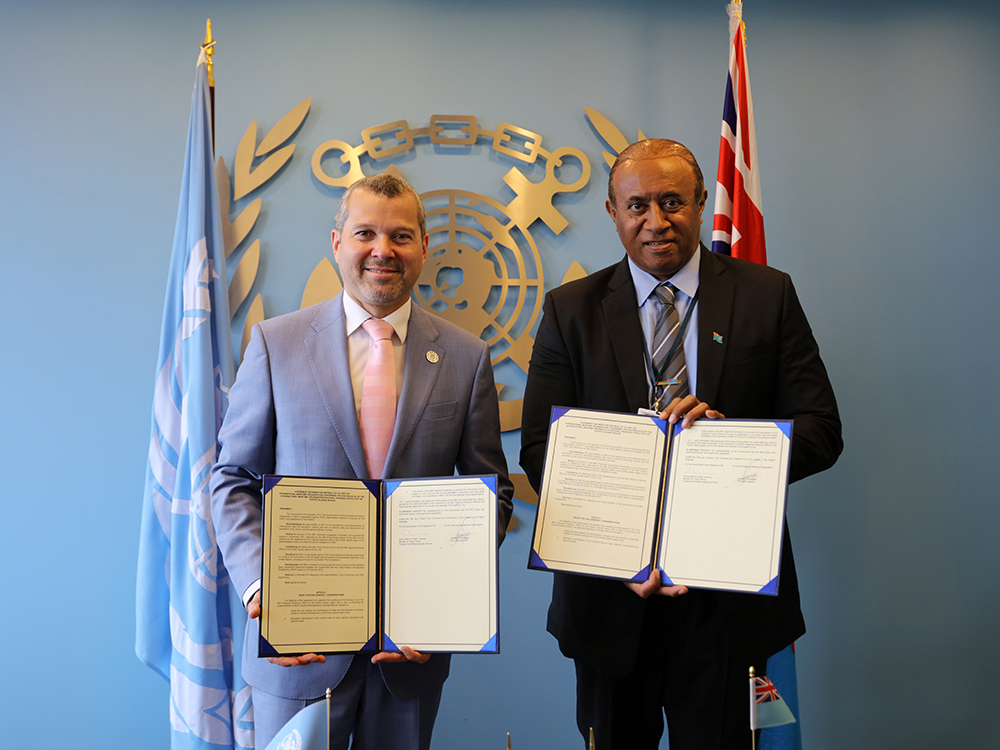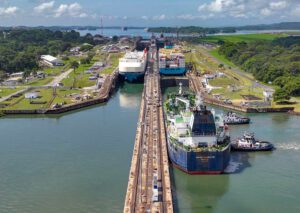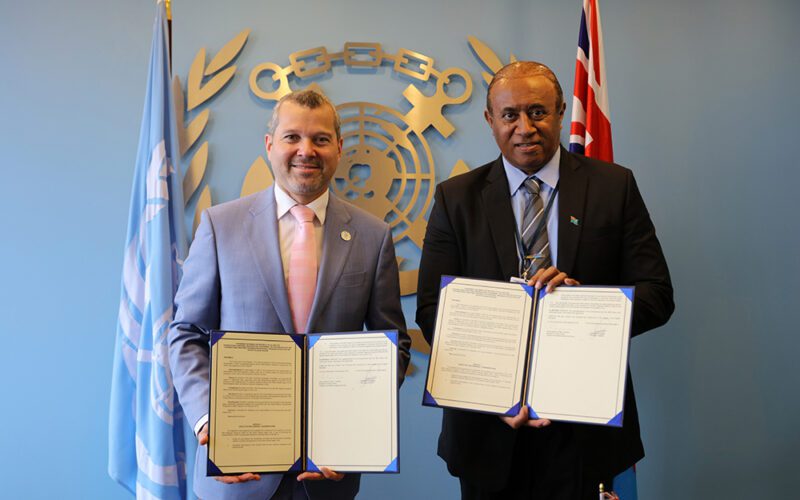
The International Maritime Organization is opening a Regional Presence Office in Suva, Fiji to serve countries and territories in the Pacific Islands region.
IMO Secretary-General Arsenio Dominguez and Fiji’s Minister for Public Works, Meteorological Services and Transport of the Republic of Fiji, Ro Filipe Tuisawau, signed a Memorandum of Understanding at IMO Headquarters in London on March 18 to seal the arrangement.
“The Regional Presence Office will support the maritime needs and priorities of countries in the Pacific Islands region,” the International Maritime Organization explained in a statement, “aligning IMO actions with national and regional development policies, while providing advice on key maritime issues such as training, safety and security, legislation and marine environment.”
The office is to also facilitate active field-level engagement in the delivery of IMO’s technical cooperation framework, according to the statement.
“The IMO Pacific Regional Presence Office provides an opportunity to address critical issues, including the challenge of providing an efficient inter-island shipping service, to ensure the safety of our Pacific people in inter-island shipping,” Tuisawau said on behalf of the Fijian Government.
“As host of this regional office, Pacific Member States will be assisted in addressing global standards for ships, and compliance issues related to energy efficiency, safety equipment and maintenance of safety systems according to IMO standards,” he added.
Pacific Island governments have over time highlighted the need for more opportunities in the sector, especially for young people, including certification for seafarers and wider employment prospects.
The new regional office, which does not yet have an official opening dates, is expected to help increase opportunities.
“I welcome this opportunity to enhance the global presence of the IMO as well as our ability to work in step with the Pacific region and Member States, Dominguez said.
In addition to Fiji, Dominguez thanked the governments of Australia, Papua New Guinea and Solomon Islands for their financial and in-kind support which helped make the collaboration a reality.
There are 14 IMO member states in the Pacific Islands region, including Australia and New Zealand. Twelve are small island developing States (SIDS), three of which are categorized as least developed countries (LDCs).
The new office in Suva would be IMO’s seventh Regional Presence Office, and would complement existing offices in Abidjan, Côte d’Ivoire for West and Central Africa (Francophone); Accra, Ghana for West and Central Africa (Anglophone); Nairobi, Kenya for Eastern and Southern Africa; Manila, the Philippines for East Asia; Port of Spain, Trinidad and Tobago for the Caribbean; and Alexandria, Egypt for the Middle East and North Africa (MENA).
Panama Canal Announces Increase in Daily Slots at Panamax Locks

In response to the present and projected level of Gatun Lake, the Panama Canal Authority in mid-March announced an adjustment to accommodate the growing demand for transits, by increasing the number of daily slots available in the Panamax Locks.
Beginning March 18, two additional slots were being offered through auction for transit dates, and an additional slot became available for transit dates beginning March 25, raising the total number of Panamax Locks transit dates from 24 to 27.
“These measures allow the majority of vessels that want to transit the Canal to have a better chance of obtaining a reservation,” the Canal Authority explained in a statement.
“Panama Canal specialists are closely monitoring the current water situation, and the measures … will remain in effect until conditions warrant changes, which will be announced in a timely manner,” the Canal Authority said.
“The Panama Canal is dedicated to enhancing efficiency and responsiveness to the evolving needs of the maritime industry,” the Authority added in its statement. “The introduction of additional slots reflects our ongoing commitment to maintaining the Panama Canal’s status as a premier global trade route.”
The additional Panamax ship slots represent a reversal of a steady decline that began in 2023 as a result of a severe, ongoing drought.
October 2023 marked the driest October on record for the Canal Watershed. In anticipation of a potential worsening of the situation in November and December, the decision was made to adjust the number of daily transits to 22 in December, 20 in January and 18 in February. It marked the first time the Canal had ever had to restrict transits.
Last November, the average number of transits through the Panama Canal was 31 transits per day: nine through the Neopanamax locks and 22 through the Panamax locks. But that amount fell to 22 in December before being raised to 24 in January.
Additionally, the Authority last year made temporary changes to the booking system, where the daily transit reservation quotas were adjusted to a maximum of 30 reservations: eight in the Neopanamax locks and 22 in the Panamax locks.
Under the changes announced in March, the daily transit reservation quota was changed to a maximum of 27 reservations: seven in the Neopanamax locks and 20 in the Panamax locks.
Traffic volumes through the Panama Canal aren’t expected to return to normal levels until perhaps next February, Panama Canal Administrator Ricaurte Vasquez told reporters in March.
Fatal Attack on Commercial Ship Condemned
The United Nations and other organizations around the globe have condemned the killing of three sailors on a bulk carrier vessel when the ship was struck during a Houthi ballistic missile attack in the Gulf of Aden.
The March 6 incident was the first confirmed fatal attack on a commercial vessel by the Iran-backed militant group in its ongoing assaults in the Red Sea.
In addition to the three crew members being killed—two Philippine nationals and one and Vietnamese—four others were injured in the attack on the m/v True Confidence, a Liberian-owned, Barbados-flagged bulk carrier.
The ship has since been abandoned.
On March 18, the United Nations released a statement via the president of its security council, Yamazaki Kazuyukiits, strongly condemning attacks on commercial vessel in the Red Sea.
The security council members reaffirmed that the exercise of navigational rights and freedoms by merchant and commercial vessels of all States transiting the Red Sea and Baab al-Mandab, in accordance with international law, must be respected.
“Towards that end, the Council members warned against the impact of the March 4 Houthi decision purporting to require ships obtain a permit from their ‘Maritime Affairs Authority’ before entering Yemeni waters on the freedom of commercial navigation and humanitarian operations, including into Yemen,” the statement read in part.
The members further called for continued international involvement in close cooperation with the United Nations and coastal nations, as well as with regional and subregional organizations to prevent further escalation with possible multidimensional consequences.

